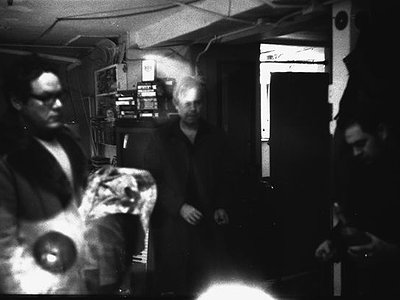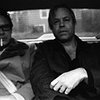The relationship between music and other forms of art – painting, video art and cinema most importantly - has become increasingly important. How do you see this relationship yourself and in how far, do you feel, does music relate to other senses than hearing alone?
SS: At times cinema is intrinsically bound to sound. We draw from film influences more than anything. A song is like a scene, plot turns and twists, space and composition, tension and release.
SH: Because music is everywhere around us all the time, we are constantly bombarded by it….. it is engineered so that a specific music matches a specific feeling or need we’re supposed to be feeling within whatever narrative we’re being fed. We’ve become robotic Pavlovian dogs that associate specific musical sounds with specific activities and emotions. I’m not a fan of programmatic music at all, but I’ve been programmed with these same contextual cues as everyone else. I think music is its own thing and because of its overuse as a tool to tell us how to feel, it’s lost some of its ability for unique expression. We try to play somewhat with the idea of changing the context because the unexpected decisions and artistic choices are always my favorite as a listener. For us, the part of the song that might sound like the happy ending to the story is actually the creepiest part, we’re always trying to use iconic sounds in an unexpected way contextually.
There seem to be two fundamental tendencies in music today: On the one hand, a move towards complete virtualisation, where tracks and albums are merely released as digital files. And, on the other, an even closer union between music, artwork, packaging and physical presentation. Where do you stand between these poles?
DA: All of our releases until now have been physical releases only, mostly as smaller, sometimes limited runs. The niche audience that we work within appreciates the boutique runs and focused art and music of the physical releases, so it works for us. On the other hand, many more people would have heard our music if it was easily available online, and that could have led to some cool opportunities or collaborations with other artists that may never happen without the widespread and instant ease of sharing digital files.
The role of an artist is always subject to change. What's your view on the (e.g. political/social/creative) tasks of artists today and how do you try to meet these goals in your work?
SH: The task of the artist today is to have a strong personal aesthetic, not one that’s solely borrowed from someone else. One that they’ve developed as their own individual voice and to hone that voice until it is as pure and strong as it can be. It’s to make the right aesthetic choices and not just the obvious ones.
DA: Yeah, as far as individuality we have some classic influences, but we've never blatantly rehashed somebody else's music. Our influences have always naturally gotten distorted or refracted just by the way our minds work. The way we think about and approach music, even when we try to rip something off, means that it comes out totally different. Sometimes our limitations are what lead to some of the more original, idiosyncratic things we come up with.
Music-sharing sites and -blogs as well as a flood of releases in general are presenting both listeners and artists with challenging questions. What's your view on the value of music today? In what way does the abundance of music change our perception of it?
DA: The longer I play music, the more I believe I'm in the mental/social health business. That's a huge value. It's not just the release of seeing a pummelling band live or getting taken by an incredible singer five feet away from you. The community and social support system between musicians, fans, promoters, engineers, etc., that has grown out of sharing music provides one of the greatest values in music. Listening to music can create reassurance, confidence, joy, nostalgia, sadness, fear... or can even help you land a skate trick.... it's pretty powerful stuff.
How, would you say, could non-mainstream forms of music reach wider audiences?
DA: Especially today with the Internet, non-mainstream bands get heard more now then ever. You can stumble across Snakefinger tracks on Youtube and go down a rabbit hole of related material. Pre-internet, your brother's acid dealer was the only guy in half the state with a Snakefinger 7". Also, these days with an epidemic of bio-pics, documentaries and journalists wanting to take credit for unearthing an obscure or forgotten musician, there is a greater opportunity for those artists to get heard as well as the people who influenced them and the people they have influenced.
Usually, it is considered that it is the job of the artist to win over an audience. But listening is also an active, rather than just a passive process. How do you see the role of the listener in the musical communication process?
DA: Bands alter their set lists all the time depending on what bands they are playing with or what kind of crowd they might be playing to that night. Even something as basic as getting some extra energy from a particularly crazy crowd is a timeless music ritual where the listener is adding to the art. Then look at bands who make a great, original first record... they get some hype and a "record deal" and then make a boring record that sounds like every other band. That's the band's own damn fault, and a worst case scenario of where the band is using the audience as an active part of the process.
In a whole different direction, I think this relates to instrumental music having the ability to spark imagination in the listener. The lack of vocals and direct, verbal story telling can leave a void for the listener to fill in their own scenario and environments. That is, in a sense, an active collaboration, whether or not both parties get to see the complete results.
SS: I’ve always been drawn to bands that at times repulse the audience in some way, various incarnations of punk rock or conceptual music
Reaching audiences usually involves reaching out to the press and possibly working with a PR company. What's your perspective on the promo system? In which way do music journalism and PR companies change the way music is perceived by the public?
DA: We really work inside a vacuum of sorts. We're not tied up in trying to get on hype lists and hipster blogs so the promo system is something we don't know too much about. For sure though, whatever buzz-band is popular this month is in part due to repetitive journalism and a hive mentality. As a live sound engineer, I have mixed a lot of sold out shows of buzz-bands where the audience is talking the entire show and not even listening to the music. When a song ends, the whole place applauds, the band starts another song and everyone starts talking again. They are there because of the social aspect of music PR, not the music.
Visit the website www.diminishedmen.com



